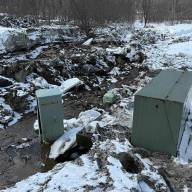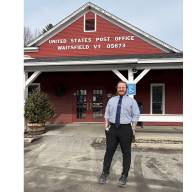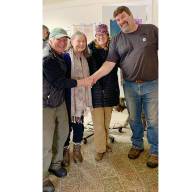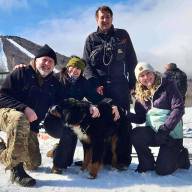In October, Friends of the Mad River welcomed Marcy Bucheit, an AmeriCorps member who will serve as watershed engagement coordinator through next summer.
AmeriCorps is a federal agency that connects people with organizations to serve their communities and address national challenges. Members serve in full- or part-time positions for up to a year with nonprofits, public agencies and community organizations.
Bucheit grew up in northeastern Illinois wanting to work with animals and be part of remedying the climate crisis, which she heard about often. When she arrived at the University of Vermont (UVM) as an undergraduate student in 2019, she enrolled in coursework on animal biology with the intent to study veterinary medicine, until an advisor suggested she explore wildlife from a more ecological and conservation-oriented lens.
MONITOR THE LANDSCAPE
As a junior at UVM, Bucheit went to Botswana in southern Africa with Round River Conservation – a nonprofit that partners with communities who lease state-owned land that has environmental protections placed on it, since much of the land supports lucrative tourism.
To maintain land rights, communities are required to monitor the landscape – for example, tracking whether wildlife populations are growing or declining in regions that host safari tourism – and otherwise protect local natural resources. Bucheit volunteered in areas where communities needed assistance collecting data because they lacked personnel and other resources to do so.
The volunteer group did field observations of wildlife – including zebra, buffalo, and giraffe – from early morning through early afternoon when the sun got too strong, Bucheit said. They counted wildlife and recorded their locations, age, and sex, and noted behaviors and signs of disease. The group also taught local people, like safari guides, how to collect data that fulfilled governmental requirements.
FIELD OBSERVATIONS
Bucheit also did field observations for her own thesis project, documenting conflict between elephants and motor vehicles in areas where elephants were known to destroy homes, dig up wells, and cause other damage. She wondered if elephants were more habituated to vehicles in areas with safari tourism, or whether they exhibited stress, aggression, or fear towards vehicles, among other questions. Her goal was to provide recommendations, such as guidelines for safari outfitters that might reduce stress for elephants while still allowing for tourism as an economic need.
The broader question, for Bucheit, was about how to balance human and wildlife needs within a larger landscape. “I think sometimes in the conservation field, it can be very easy to have research that’s focused on wildlife and other organisms, and what they need. But without that component of, ‘how do we actually make this work for the communities living alongside wildlife?’ it’s probably not going to be a sustainable solution,” she said.
“A central question for me, with research, is if the science doesn’t communicate to normal people, why did I do it, and what is the purpose?” she added.
THE SCIENCES
Bucheit wanted to join FMR as an AmeriCorps member because she wanted to explore relationship building and how to communicate scientific findings effectively with the public – both capacities she found to be underappreciated in the sciences.
She also wanted more experience in approaching the natural world from the perspective of landscapes and ecosystems with complex parts in need of balancing, since her studies at UVM focused more on animal biology – including the physiological and behavioral aspects of animals.
That kind of ecological thinking is needed everywhere, included here in The Valley, she said – like with the planning of the Irasville area in Waitsfield, where the question of how to balance development projects while protecting key wetlands is a critical one.
STAY TUNED
At FMR, Bucheit is working with staff to plan a series of community workshops that tie watershed conservation expertise with peoples’ desires and needs. “The question is, how to get people interested in learning about local environments and conservation work through the activities they love, like skiing, hiking and fishing?” she said.
In the coming year, with Bucheit’s help, FMR is planning to host outdoor public workshops on wildlife tracking, bear safety, fly fishing, birding, and other topics. Stay tuned.













